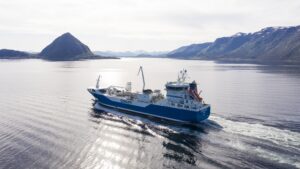Gasum’s bio-LNG fleet powers FuelEU maritime compliance pool

By using its own vessels as compliance generators, Gasum is adding flexibility to its pooling service at a time when demand for regulatory surplus is increasing towards the end of the year.
Gasum’s fleet comprises two bunkering vessels - which deliver LNG and bio-LNG to ships in port - and two gas carriers that transport liquefied gas across the Nordics and Northern Europe.
All are equipped with dual-fuel gas engines, allowing them to run on renewable bio-LNG.
“As we are now in the last quarter of the first FuelEU Maritime regulation year, there’s never been a more critical moment for ship owners to act,” said Jacob Granqvist, Vice President, Maritime at Gasum.
“Joining Gasum’s FuelEU Maritime pool is the easiest and most reliable way to secure compliance. Adding our own fleet to the pool as compliance generators helps secure more surplus, but the amount remains limited.”
Pooling strengthened by bio-LNG operations
Gasum’s gas carrier vessels are chartered from Anthony Veder, which also participates in the company’s FuelEU Maritime pool. One of Gasum’s bunker vessels, Coralius, is jointly owned by Anthony Veder and Sirius Shipping, while the other, Kairos, is owned by Bernhard Schulte.
Alongside Gasum’s own ships, the pool includes other partners operating dual-fuel vessels capable of generating surplus compliance. By running on bio-LNG, these ships produce emission reductions that can be distributed within the pool to balance overall compliance levels.
The FuelEU Maritime regulation aims to lower the greenhouse gas intensity of fuels used in shipping by progressively increasing requirements for renewable and low-carbon fuels. To help the sector transition, the framework allows companies to form compliance pools, where collective emissions can be balanced across multiple vessels.
Bio-LNG plays a crucial role in this effort. Its life-cycle emissions are around 90% lower than those of conventional marine fuels such as marine gas oil (MGO), and when produced from manure, bio-LNG can even achieve negative emissions.















